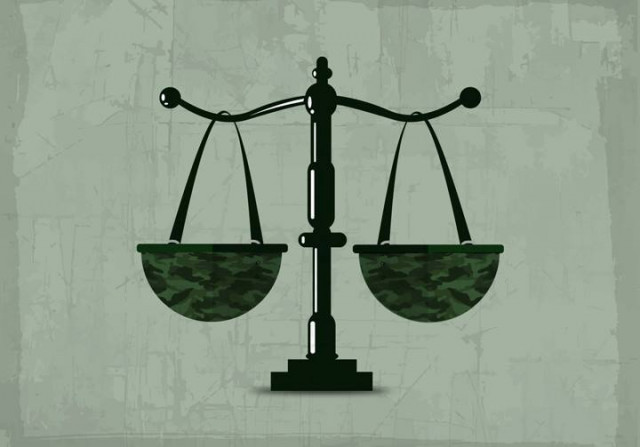Delaying tactics: Military courts put civilian courts on backburner
47 new civilian courts yet to start working as there is no building for them

47 new civilian courts yet to start working as there is no building for them. PHOTO: CREATIVE
With the provincial authorities geared up to establish military courts, the pending issue of starting up 47 newly created civilian courts has been put on the backburner.
In 2013, the then Sindh High Court (SHC) chief justice, Mushir Alam, had proposed to the provincial government to double the number of courts to contain the growing militant, sectarian and ethnic violence through speedy prosecution of the suspects. Subsequently, the government had approved 173 new courts of judicial magistrates, assistant sessions judges and additional district and sessions judges in three different phases.
According to officials privy to the matter, 116 new courts have so far been created in two phases while the remaining will be created in the third phase. In recent months, the (SHC) department promotion committee has promoted 68 judicial magistrates and civil judges to the post of senior civil judges and assistant sessions judges. Additionally, the committee also appointed 49 judicial magistrates to fill in the new courts.
Despite the availability of manpower, 47 additional civilian courts in the city have yet to start dispensing justice. There is no space to accommodate the new courts on the premises of the City Courts and the government has not been able to provide any alternative building. “All these new courts merely exist on paper due to a lack of space,” claimed an official privy to the process.
The government should focus on strengthening and properly facilitating the civilian courts instead of making another form of judiciary, said a member of the Karachi Bar Association (KBA), Adil Khan, who was referring to the recent move to establish military courts.
“Cases linger due to weak investigation and lack of evidences,” he pointed out. “If government, in real spirit, had focused on implementing the existing acts, such as the ‘unusual’ witness protection act, the situation would be much better.”
He added that anti-terrorism courts were established with the same idea to expedite prosecution against criminals. “The existing ATCs have the same role as the proposed military courts,” he said. “Then why the need for another court with the same functions?”
As the authorities struggle to find office space for the new civilian courts, the new staff hired has nothing to do. “The judges are sitting idle, the staff is drawing salaries just because there is no space to set up their chambers,” the officer said.
Last year, the high court officials and lawyers had suggested relocating all the existing courts from City Courts to the Karachi Central Jail, where trials could be conducted in a relatively secure environment. The SHC sent several reminders to the authorities to expedite the process of shifting the prison, said an official, adding that it was suggested later that the courts cannot be relocated to inside the prisons as there were security threats.
Now, SHC officials and the Karachi Metropolitan Corporation are once again looking for government buildings in the vicinity of the City Courts to set up the new courts.
“Lawyers are the main hurdle because they do not want the lower courts to move to their respective districts,” said an officer. “Every time an attempt is made to scatter the courts from their current location in District South, the legal fraternity puts up strong resistance and the authorities, ultimately, give in.”
According to Karachi Bar Association’s newly-elected president, Naeem Qureshi, SHC registrar Muhammad Faheem Siddiqui and District South deputy commissioner visited some government buildings around the City Courts to find a suitable space and start the new courts.
Qureshi added that there is a proposal under consideration to use the storeroom building, where case properties are kept in custody, and the City Court record room as chambers for the judges but nothing has been finalised yet.
Published in The Express Tribune, February 5th, 2015.



















COMMENTS
Comments are moderated and generally will be posted if they are on-topic and not abusive.
For more information, please see our Comments FAQ